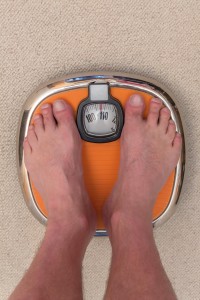Body mass index (BMI) is a measure often used as a means to measure health. It’s a number determined by dividing body mass by height squared and is an estimate of body fatness. Figure yours easily by visiting this BMI Calculator. However, it’s far from perfect. While it is one piece of information about health, it’s absolutely not the last word on a person’s health status. In fact, a study published recently showed that many people who have a BMI in the “overweight” or “obese” categories may actually be very healthy.(1) While BMI is one easy indicator of risk, it shouldn’t be used alone as a health assessment. Here are a few other ideas for ways to measure health that may be more meaningful than BMI (and certainly in concert with it):
- Waist Circumference – a high waist circumference (measure at the belly button) of >40 inches for men and >35 inches for women is an independent risk factor for type 2 diabetes, high blood pressure and high cholesterol, and cardiovascular disease in individuals who also have a BMI greater than 25.(2) So, it’s good to use waist circumference in addition to BMI to help better estimate the risks associated with being “overweight” or “obese” according to BMI.
- Percent Body Fat – both waist circumference and BMI use other measures to infer percent body fat, but there are a few ways to actually do this – they all involve having scans of your insides. Not very practical for most people. But it’s out there and is actually a pretty good indicator of health – or at least of future health risks.
- Fasting Blood Glucose (Sugar) – this is a great indicator of risk for diabetes. It’s easy, inexpensive and can identify risk for pre-diabetes, which is really real diabetes in its earliest form. You’re looking for a number generally under 100.
- Lipid Values – LDL, Triglycerides (TG), and HDL are what you’re looking at here. Generally, LDL (<100) and TG (<150)are the ones you want lower and HDL (>60) is the one you want higher.(3) These numbers are independent risk factors for cardiovascular disease.
So, what’s the moral of the story? If you have a high BMI, get some additional testing. Be sure you’re eating well and exercising regularly. Manage your stress. If you have other habits that need attention, such as smoking or over-consumption of alcohol, deal with those now. A high BMI doesn’t necessarily mean you are unhealthy, but it could. Take time to get a good assessment of your risk. Your life is worthy of your attention.


